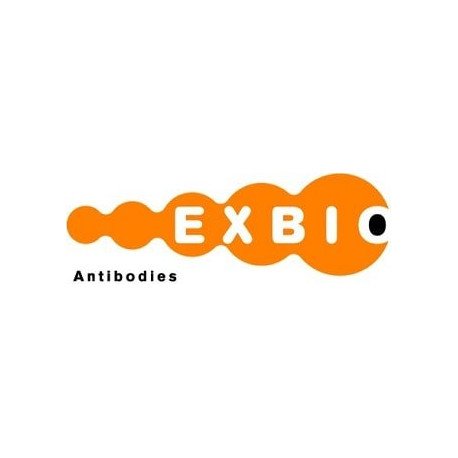Cart 0 Product Products (empty)
No products
To be determined Shipping
0,00 € Total
Prices are tax excluded
Product successfully added to your shopping cart
Quantity
Total
There are 0 items in your cart. There is 1 item in your cart.
Total products (tax excl.)
Total shipping (tax excl.) To be determined
Total (tax excl.)
Data sheet of Mouse Monoclonal to p53 (Phospho-Ser392)
| Brand | Exbio |
| Product type | Primary antibodies |
| Reactivity | Human |
| Clonality | Monoclonal |
More info about Mouse Monoclonal to p53 (Phospho-Ser392)
| Brand: | Exbio |
| Product no.: | 11-467-C025 |
| Product type: | Primary antibodies |
| Host species: | Mouse |
| Product name: | Mouse Monoclonal to p53 (Phospho-Ser392) |
| Antigen: | p53 (Phospho-Ser392) |
| Clonality: | Monoclonal |
| Clone: | FP3.2 [FPS392] |
| Isotype: | IgG1 |
| Immunogen: | KLH-conjugated phosphopeptide RHKKLMFKTEGPDS[P]D, corresponding to amino acids 378-393 of human p53. |
| Format: | purified |
| Specificity: | The antibody FP3.2 [FPS392] reacts with human p53 tumour suppressor protein phosphorylated at CKII site (Ser 392). |
| Categories: | Transcription Regulation & Nuclear Proteins (Human), Transcription Regulation & Nuclear Proteins |
| Concentration: | 1 mg/ml |
| Storage buffer: | Phosphate buffered saline (PBS) with 15 mM sodium azide, approx. pH 7.4 |
| Storage / stability: | Store at 2-8°C. Do not freeze. Do not use after expiration date stamped on vial label. |
| Background: | The tumour suppressor protein p53 is a key element of intracellular anticancer protection. It mediates cell cycle arrest or apoptosis in response to DNA damage or to starvation for pyrimidine nukleotides. It is up-regulated in response to these stress signals and stimulated to activate transcription of specific genes, resulting in expression of p21waf1 and other proteins involved in G1 or G2/M arrest, or proteins that trigger apoptosis, such as Bcl-2. The structure of p53 comprises N-terminal transactivation domain, central DNA-binding domain, oligomerisation domain, and C-terminal regulatory domain. There are various phosphorylation sites on p53, of which the phosphorylation at Ser15 is important for p53 activation and stabilization. |
| Purity: | > 95% (by SDS-PAGE) |
| Purification: | Purified by protein-A affinity chromatography |
| Product specific references: | *Sikorski K, Mehta A, Inngjerdingen M, Thakor F, Kling S, Kalina T, Nyman TA, Stensland ME, Zhou W, de Souza GA, Holden L, Stuchly J, Templin M, Lund-Johansen F: A high-throughput pipeline for validation of antibodies. Nat Methods. 2018 Nov;15(11):909-912., *Blaydes JP, Craig AL, Wallace M, Ball HM, Traynor NJ, Gibbs NK, Hupp TR: Synergistic activation of p53-dependent transcription by two cooperating damage_x000D_ recognition pathways. Oncogene. 2000 Aug 10;19(34):3829-39. |
| General references: | *Tanigawa S, Fujii M, Hou DX: Stabilization of p53 is involved in quercetin-induced cell cycle arrest and_x000D_ apoptosis in HepG2 cells. Biosci Biotechnol Biochem. 2008 Mar;72(3):797-804. , *Taylor WR, Agarwal ML, Agarwal A, Stacey DW, Stark GR: p53 inhibits entry into mitosis when DNA synthesis is blocked. Oncogene. 1999 Jan 14;18(2):283-95._x000D_ _x000D_ , *Taylor WR, DePrimo SE, Agarwal A, Agarwal ML, Schönthal AH, Katula KS, Stark GR: Mechanisms of G2 arrest in response to overexpression of p53. Mol Biol Cell. 1999 Nov;10(11):3607-22._x000D_ , *Agarwal ML, Agarwal A, Taylor WR, Chernova O, Sharma Y, Stark GR: A p53-dependent S-phase checkpoint helps to protect cells from DNA damage in_x000D_ response to starvation for pyrimidine nucleotides. Proc Natl Acad Sci U S A. 1998 Dec 8;95(25):14775-80._x000D_ _x000D_ _x000D_ , *Agarwal ML, Agarwal A, Taylor WR, Stark GR: p53 controls both the G2/M and the G1 cell cycle checkpoints and mediates reversible growth arrest in human fibroblasts. Proc Natl Acad Sci U S A. 1995 Aug 29;92(18):8493-7. |
| Related products: | - Mouse Monoclonal to PCLO - Mouse Monoclonal to PAC-1 - Mouse Monoclonal to PAG / Cbp |
| Shipping condition: | Room temperature |


